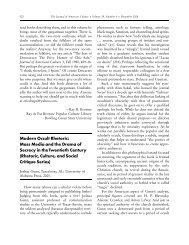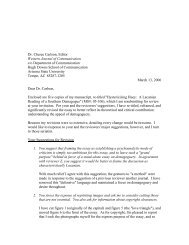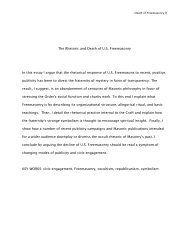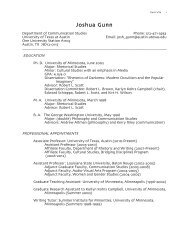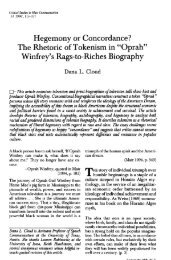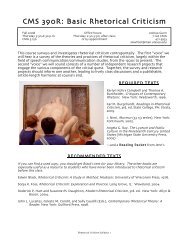On Viewing Rhetoric As Epistemic: Ten Years Later.
On Viewing Rhetoric As Epistemic: Ten Years Later.
On Viewing Rhetoric As Epistemic: Ten Years Later.
You also want an ePaper? Increase the reach of your titles
YUMPU automatically turns print PDFs into web optimized ePapers that Google loves.
RHETORIC AS EPISTEMIC 263<br />
fan) epistemic self-portrait: the partia:Iar<br />
picture of human beings as active intelli'<br />
gences which govems his stance toward the<br />
objects of human understanding." 17 My<br />
daim is that any "epistemic self'portrait"<br />
that approaches completenesi must include<br />
rhetoric.<br />
'\tr7hat sort of knowledge does rhetoric seek<br />
to achieve? fie understanding of what it<br />
means to be persuaded and to persuade.r8<br />
Such an understanding is both general and<br />
specific: general, ia that one's on'n grasp of<br />
oneself as a social being with others in society<br />
is essential to being human, and specific<br />
in that one must continually face concrete<br />
sihrations in which one will act to aftrm<br />
son:e commitments. None of these statements<br />
is n:eant to deny that one will continually<br />
behave scarcely aware of the patterns that<br />
behavior takes let alone with highly conscious<br />
grasp of the reasons for those Patterns.<br />
But the fact that much, probably nrost, of<br />
our behavior is rvell fixed through complex<br />
reinforceorents does not mean that s'e cannot<br />
become focally al'are of these patterns and<br />
their consequences. .tiThen we do become so<br />
an'are, tben we can act critically, and usually<br />
rhetorically, to reafirnr or modify tlrem, in<br />
short, to b:come n:ore fully committed.<br />
In an analysis much like the one here,<br />
Thon,as Farrell pictures the Cartesian bequeatbed<br />
attitude of detachment as descriptile<br />
of modern science. Farrell would rnove<br />
beyond that attitude in assessing the rhetorical<br />
dimension of social knowledge as taking<br />
a community of belief as necessary.le The<br />
requisite attitude to balance detacbtnent in<br />
tz lbid., p. 3.<br />
18 Hcnry \7. Johnstone, Jr., has written that<br />
"man is a petsuiding and'pirsuaded animat, and<br />
. . . v.'henever he steps outside the forum in<br />
which rhetoric loses swiy. he is in dangcr of losing<br />
his human dignity." "The Relevancc of Rhetorjc<br />
to Philosophy and of Philosophy to <strong>Rhetoric</strong>,"<br />
Quarteill fournal of Speecb,52 (Feb. 1966),45.<br />
:e"Knos'ledge, Consensus, and <strong>Rhetoric</strong>al<br />
Theory," Qaarterly Jounal ol Speecb, 62 (Feb.<br />
1976), see esp., 6-7, altbough thc entire essay is<br />
highly pertinent to grasping the idea of rhetoricas-eoistemic.<br />
knowing would be attacbtneil in uoderstandin&<br />
Although modern science is founded on<br />
the firm belief that experience must be instructivg<br />
Haas-Georg Gadaner argues that<br />
the $'pical attitudes of science leave "experience"<br />
incompletely understood; he undertakes<br />
to rectify tbe situation. Among his<br />
remarks, this ooe is particulatly trseful: "Experience<br />
teaches us to recogoize reality. Ifhat<br />
is properly gained from all elperiencg then,<br />
is to know what is. But 's'hat is', here, is<br />
not this or that thing but 'what cannot be<br />
done away q'ith'. . ." 20 \Phat cannot be<br />
dooe away with in a community is commitment<br />
to the norms of that community. Commitn:ent<br />
and rhetoric stand in a reciprocal<br />
relationship: commitment generates rhetorig<br />
and rhetoric generates commitment<br />
Is Rgrronrc.'lr- REL.{Trvis}{ Vrcious?<br />
No. <strong>On</strong>e may, of course, eat gluttonously<br />
or quote Shakespeare 6lled with vain pride<br />
in the sound of one's own voice. Likenise<br />
one may argue with s'anton disregard for the<br />
fabric of social comn:itments or, pcrhaps, in<br />
blithe ignorance of the possibilities of either<br />
reaffirrnation or reform. But the grafuitous<br />
abuse of rhetoric seen:s of tess concern to<br />
thoughtful people than the sheer relatilism<br />
of the point of view that takes rhetoric as<br />
episternic. For tbese people, relativism seems<br />
to make abuse not simply an occasional occurrence<br />
but likely. At least sucJr objections<br />
are t1'pical of tlre discussions I hate often<br />
had n'ith colleagues and students since my<br />
effort in L967.<br />
The difficulty rests in the belief that rela.<br />
tivjsm obviates the lery idea of knon'ledge.<br />
From this point of view knowledge must be<br />
a priori, that is, s'e must know in sorne general<br />
or unitersal sense, before q'e can know<br />
at all in any specifc sort of way. This point<br />
of view seerns to be entailed in the traditional<br />
way of putting the question, What is<br />
knos'ing? The question itself suggests that<br />
.sTtr:h<br />
cnd .\ttthod, p. 120.<br />
i'i;'..<br />
,l<br />
;; '<br />
I45



